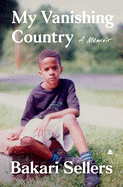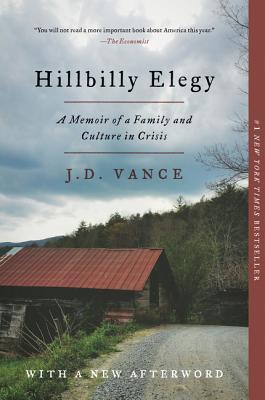West Palm Beach, FL. My Vanishing Country is a 2020 memoir by Bakari Sellers, a lawyer and political commentator on CNN who was the youngest representative in the South Carolina legislature and hails from an area of the state that is part of the rural Black Belt. As he explains in the opening to the book, “I’m from what’s called the Low Country in South Carolina, where beauty and blight and history are intertwined.” It’s a place with fertile soil and historic communities, but diminishing jobs and reduced access to education and healthcare. In black communities like Sellers’s, there’s a sense of being the people left behind during the Great Migration. But Sellers loved and learned from his small hometown of Denmark, SC, and his success in the broader world remains marked by his roots in this community.
In the first few chapters, Sellers lovingly introduces us to his corner of South Carolina. While the media often portrays rural America as white America, Sellers grew up in a town that was majority black and even has a historically black college, Voorhees College. But Denmark is like many other small rural towns in trouble; the jobs have dried up, the roof of the school cafeteria recently collapsed, and it’s a place where some people ride their bikes and lawnmowers to the store because they can’t afford the cars or the insurance. When he ran his first statewide campaign, Sellers “knew I could speak about the ‘Corridor of Shame,’ where thousands of rural children across the South attend schools that are dilapidated and falling apart. I’m a product of the proverb ‘it takes a village to raise a child,’ but all around me I was seeing the village crumbling.”
Denmark is the kind of place that other Southerners call “country.” The distinction is familiar to many from the South, but it can also be explained through the song “Tramp” by Otis Redding and Carla Thomas. In the song, Carla calls Otis a tramp and accuses him of being “country,” he’s “straight from the Georgia woods.” She says “you wear overalls, and big old brogan shoes and you need a haircut,” plus “you haven’t even got a fat bankroll in your pocket, you probably haven’t even got twenty-five cents.” Otis sings back, as far as being country “that’s all right” and being straight from the Georgia woods, “that’s good.” Besides, he’s got “six Cadillacs, five Lincolns, four Fords, six Mercuries, three T-Birds, a Mustang” and he’s “a lover.” In My Vanishing Country, Sellers is likewise proud of his hometown and sees places like it as important. Those who left in the Great Migration may think it was good to leave these parts of the South behind, but for Sellers, “every ounce of black cultural liberation, every bit of political ideology, first derived from the South.” The soil is still rich.
Today Bakari Sellers lives and practices law in Columbia, SC. He graduated from high school at sixteen and went on to Morehouse in Atlanta. After discovering student government and politics, Sellers returned to South Carolina and ran for a seat in the state legislature at 21. He got the seat and did law school at USC while serving in the legislature. At 29 he ran for state lieutenant governor, a race he lost but which launched him into statewide Democratic politics. In recent years he’s also become a political analyst for CNN, as well as a husband and a father.
What accounts for Sellers’s precocious success in the world? Sellers may have come from a community that our country knows little about, but he was always linked to more. His father is Cleveland Sellers, a well-known Civil Rights activist, who along with Bakari’s mother, raised him to have a rich understanding of who he was and the history and strengths of his community. Not only did his parents give him a strong sense of identity, they and his siblings encouraged him in school and set high expectations. Through his father, he also had connections to other Civil Rights figures and role models, like Julian Bond, an unofficial uncle for the young Sellers. At Morehouse, Sellers was introduced to the “Morehouse mystique” as he became one of the famous “Morehouse men.” The chapters on Morehouse describe well what makes the school special. Sellers was already accustomed to being in a majority-black learning environment, but Morehouse gave him more than a taste of independence, it introduced him to leadership alongside new ideas, helped him learn to network and organize, and gave him a sense of the role that he could play on a bigger stage. Morehouse reinforced the potential Sellers’s friends and family already saw in him, and its community empowered him to take on bigger challenges.
It is hard to read My Vanishing Country without reflecting back on the 2016 memoir by J.D. Vance, Hillbilly Elegy. Both books draw attention to a side of country life that does not often appear in the pages of Garden & Gun. Both authors came from communities that are strained and cracking and full of people who seem far away from the “American Dream.” According to their geographic origins, neither Sellers nor Vance might be expected to succeed in the world. Yet both have become lawyers and succeeded in dramatic fashion. Their memoirs attempt to explain why while also considering those who seem trapped in the cycles that these two unusual men seem to have escaped.
There are significant differences between My Vanishing Country and Hillbilly Elegy. The story of Bakari Sellers is a story of precocity. He was born with adult ambitions. In Hillbilly Elegy, Vance was never entirely sure of his abilities until his time in the Marine Corps. The two authors had very different family backgrounds. Sellers came from a poor town, but his family was stable and rich in education and connections. Instability defined family for much of Vance’s early life and he lived in an insular cultural world, with little awareness of the ways that other people lived.
Sellers and Vance also differ in their diagnosis of what ails those who seem barred from the American Dream and in their prescriptions for change. Though Vance’s faulting of Scots-Irish/hillbilly honor culture has been perhaps exaggerated by his critics, in the book he does say explicitly of his people that “our men suffer from a peculiar crisis of masculinity in which some of the very traits that our culture inculcates make it difficult to succeed in a changing world.” He finds that the “story of economic insecurity is, at best, incomplete” and does blame many white working-class people for becoming the equivalent of “welfare queens” even while they claim to be hard-working. Vance does not tell a simple bootstrap narrative, but his solutions do include a renewed emphasis on personal responsibility, and he is skeptical of the government’s ability to constructively help working class whites, though he does suggest some policy changes and has become more involved in politics in the years since his memoir.
In contrast, Sellers prefers to focus on the systemic forces that afflict these struggling corners of America. He writes about the historical disadvantages of black people, especially in the South, and, like Vance, the decline of manufacturing jobs. He became involved in government to speak for his corner of the state and to bring change. As a state representative, he sought to improve health care in rural areas through expanding Medicaid and worked to bring jobs to his county. He does not blame the culture of places like Denmark, but neither does he consider personal responsibility irrelevant. His chapters about his early life and the friends he grew up with clearly identify the role of choice and not just context in determining someone’s fate.
If it seems that My Vanishing Country and Hillbilly Elegy have opposite approaches to understanding the problems of their hometowns and solving them, that is not entirely the case. Both books strongly reinforce the need for adults to help children successfully navigate a challenging world, and each narrative demonstrates the power of family stability or instability. Sellers recognizes very clearly that his advantage in early (and continuing) life was his family. Vance acknowledges that his family instability had to be not just endured but overcome. In this way, both books are reminiscent of the 2006 documentary Country Boys by David Sutherland, which examined the “role of caring adults in the lives of young people.” Country Boys followed two teenage boys in David, Kentucky, another struggling place, and demonstrated that success for young people has some links to personal ability but is, in many ways, dependent on the people in their lives. The difference between a child’s potential and its realization is very often the involvement of a caring adult.
While the Moynihan Report and research from that era typically suggested that strong fathers were required for successful youth and families, both Vance and Sellers (and Country Boys) demonstrate that gender is not the most significant attribute of a caring and stable older adult. Both authors believe that fathers are very important; Sellers was shaped by a wonderful father. But My Vanishing Country also recognizes the contributions of Sellers’s mother, his older sister, and his older aunts. There is an entire chapter about the significance of black women. Hillbilly Elegy acknowledges the painful effects of an absent father, but it was Vance’s Mamaw who saved his life. Her values, persistent care, and reliable presence were what mattered most. His mother was around, but she was unable to care for him well. The most relevant factor in parenting was ability, not just biological proximity. Both memoirs suggest that the quality of parenting may matter more than who the parent is with regard to gender or generation.
My Vanishing Country and Hillbilly Elegy also make strong arguments for the power of networks. Bakari Sellers benefited early on from his father’s connections to other figures in the Civil Rights movement, if only for perspective and relationships. Once he began attending Morehouse, he realized even more the power of networks in employment and occupation. One of the strengths of Morehouse is its emphasis on a brotherhood of alumni. As a budding politician, Sellers forged his own connections to people all over the state and went door-to-door when it was considered out of style. J.D. Vance started in a difference place altogether. For most of his life, he took on the world in his own way and usually alone. But when he attended Yale Law School, he began to understand the role of networks in the world of success. As he learned to open up and connect more with people outside his family, his friends and faculty helped guide him through social settings, interviews, and life decisions. As someone attending Yale, he had access to opportunities he would never have had if he had continued at Ohio State. The lives of Sellers and Vance not only emphasize the importance of caring adults for giving young people a start in the world, but also the role of networks (and networking) in achieving the “American Dream.”
Together My Vanishing Country and Hillbilly Elegy tell us a great deal about place, both this country as a whole and their country homes within it. Both books emphasize the significance of hope and the belief in possibilities for individuals from more disadvantaged areas. When J.D. Vance reflected on the world he came from and his own past, he found himself struck by the “lack of agency here—a feeling that you have little control over your life.” Vance developed that sense of agency and Sellers was born into a family full of it. Both Vance and Sellers have achieved the type of success that equates to the American Dream, but their experiences are a sad reminder that very often success and the way toward it is tied to places outside of rural areas and country communities. Sadly “success” often means getting out, if only because the opportunities are elsewhere.
Each memoir testifies to the combination of economic and cultural factors involved in the rise and fall of towns and cities in America. Middletown, Ohio, was not the same after the Amco jobs disappeared. All kinds of places and working-class people in America are deeply affected by the ongoing changes in our economy. But communities are also imperiled by cultural factors, whether that is the culture surrounding the community (including the persistence of racism) or certain cultural norms within the community (Vance believes honor culture is a liability in our era). People in these places are truly caught between ways of life.
What will it take to revitalize these places and reinvigorate the people in them? Bakari Sellers hopes to bring more opportunities to the people in these places. J.D. Vance hopes, in part, to bring more people to the opportunities, through adapting their culture and through better exposure and understanding of how and where success happens. While Vance does not despise everything about where he comes from (as some critics think), Sellers does a better job reminding readers that many of the values he learned at home deserve to be carried forward. You can leave your corner of the country without escaping it. And each memoir testifies to the importance of bringing something back. The end of My Vanishing Country has Sellers discovering a national platform to be a “voice for the voiceless” after the shooting at Emanuel Church in Charleston, South Carolina, by which he was personally affected. Hillbilly Elegy ends with Vance mentoring children from similar backgrounds and buying needy kids toys every Christmas. Since then he has also joined the world of venture capital and seeks to bring investment and opportunity to middle America.
Most significantly, both memoirs emphasize that the power of place relates directly to people. Close bonds with friends and family are what make a community a place worth living. Neighbors you can know and trust make a neighborhood a home and a safe harbor. That stability is what allows a child to grow and thrive, and it may very well exist in a town that is down on its luck, but it is harder to sustain there. The connections a child has also determine in many ways what opportunities he or she will have as they age and eventually explore the wider world. There is a difference between an isolated and an insular place. My Vanishing Country and Hillbilly Elegy narrate the strengths and weaknesses of country places for children growing up in the twenty-first century. They remind us that these places are still real and still part of America, even if our cultural narratives about the American Dream often neglect them and the people who inhabit them.














